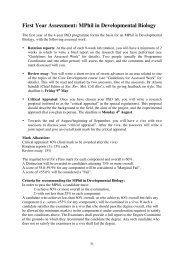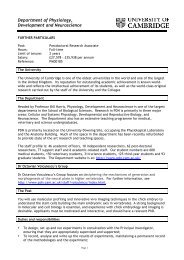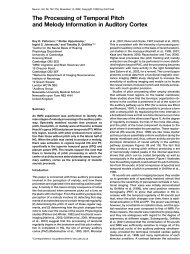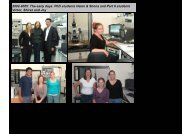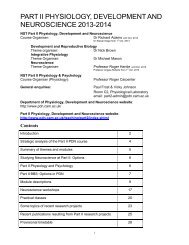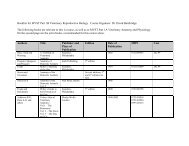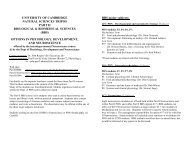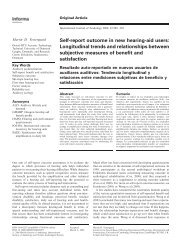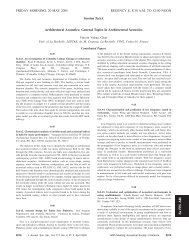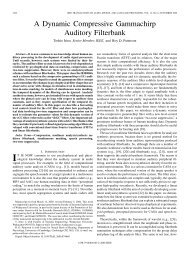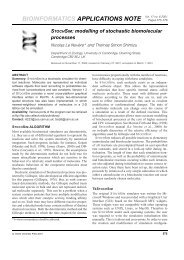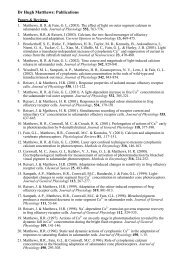part ii physiology, development and neuroscience - Department of ...
part ii physiology, development and neuroscience - Department of ...
part ii physiology, development and neuroscience - Department of ...
Create successful ePaper yourself
Turn your PDF publications into a flip-book with our unique Google optimized e-Paper software.
Discovering endophenotypes: the connection between genes <strong>and</strong> neuropsychiatric syndromes (Dr Jeff<br />
Dalley)<br />
This workshop will review the concept <strong>of</strong> endophenotypes in experimental Psychiatry. The notion that<br />
genes <strong>and</strong> environment combine to confer susceptibility to the <strong>development</strong> <strong>of</strong> complex, polygenic<br />
brain disorders such as schizophrenia, attention-deficit hyperactivity disorder (ADHD) <strong>and</strong> drug<br />
addiction was first proposed by Gottesman <strong>and</strong> Shields in 1973. We will explore the utility <strong>of</strong><br />
measuring intermediate phenotypes (e.g., based on neurophysiological, biochemical,<br />
endocrinological, neuroanatomical <strong>and</strong> cognitive components) to the discovery <strong>of</strong> gene influences in<br />
brain syndromes <strong>and</strong> discuss how this approach can aid disease diagnosis <strong>and</strong> the <strong>development</strong> <strong>of</strong><br />
animal models.<br />
Cell biological approaches to the study <strong>of</strong> neurons (Pr<strong>of</strong>. Andrea Br<strong>and</strong>)<br />
This workshop will explore the different ways <strong>of</strong> labelling, visualising <strong>and</strong> manipulating cells in the<br />
nervous system. We will discuss a range <strong>of</strong> molecular genetic approaches that enable individual cells, or<br />
groups <strong>of</strong> cells, to be tagged in vivo, as well as techniques for knocking out or misexpressing specific<br />
genes in a targeted fashion. We will explore the benefits <strong>of</strong> these technologies <strong>and</strong> discuss other<br />
approaches that could usefully be developed.<br />
Designing behavioural neurophysiological studies (Pr<strong>of</strong>. Wolfram Schultz)<br />
This workshop will present a range <strong>of</strong> key experiments <strong>and</strong> consider the principal factors that go into a<br />
useful study. We will look at the constraints imposed by behaviour, electro<strong>physiology</strong> <strong>and</strong> specific<br />
species <strong>and</strong> discuss example experiments in which these have been successfully taken into<br />
consideration. We will try to identify future appropriate research questions <strong>and</strong> techniques <strong>and</strong> assess<br />
how they differ from less promising ones.<br />
Shedding light on brain function: Optogenetics <strong>and</strong> beyond (Pr<strong>of</strong>. Ole Paulsen)<br />
This workshop will explore new optogenetic approaches to the study <strong>of</strong> neurons <strong>and</strong> their circuit<br />
functions. We will describe the basic principles <strong>of</strong> cell-type-specific expression <strong>of</strong> light-activated<br />
channels, <strong>and</strong> how they can be used to activate or silence neurons. We will discuss the opportunities<br />
<strong>of</strong>fered by this new technology, <strong>and</strong> also some possible problems <strong>and</strong> caveats.<br />
18



